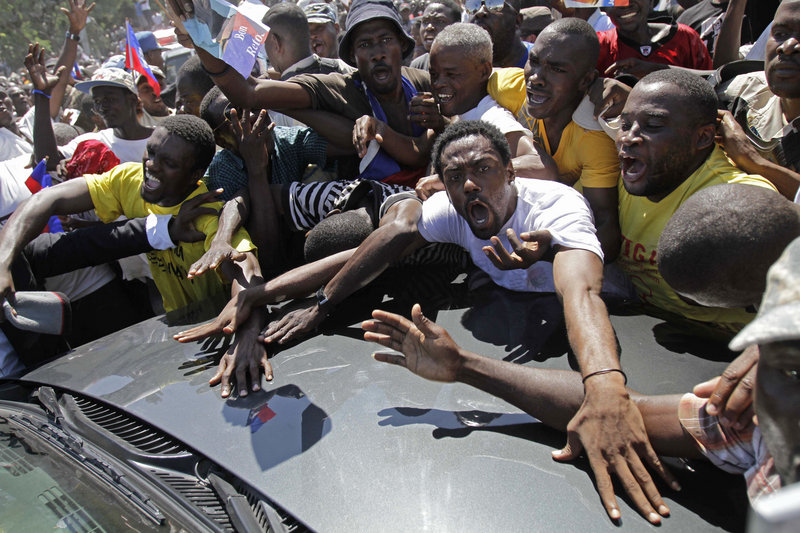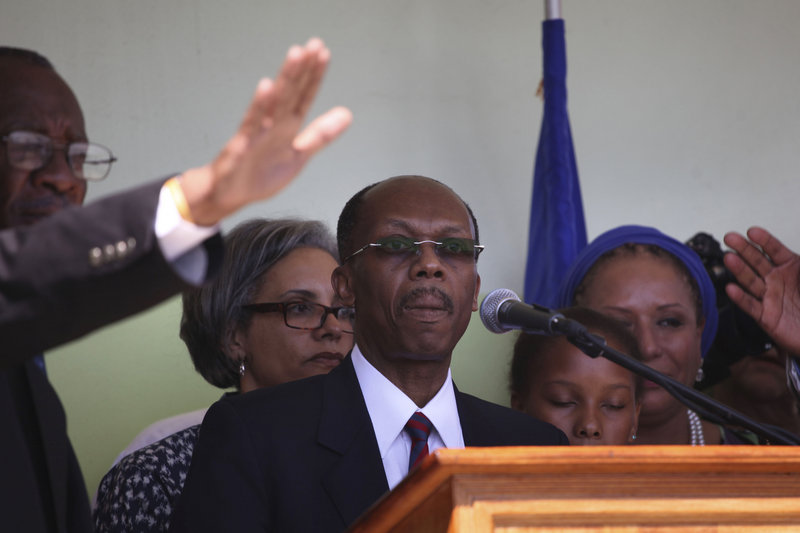PORT-AU-PRINCE, Haiti -The man they call “father” was back in Haiti, but when Jean-Bertrand Aristide landed here Friday after seven years in exile – and less than two days before a crucial presidential vote – many of his supporters couldn’t believe it.
So they followed the former president’s caravan through the streets and streamed over the walls of his stately villa to get a better look.
It was an extraordinary scene that spoke to the fervor of Aristide’s followers, and their desperation. Young men and boys scrambled onto the balconies of his home, pressing themselves to the windows for a glimpse of Aristide. Teenagers scaled his mango trees, angling for a view inside. Others roamed the grounds, shouting “Vive Aristide!” and “No election Sunday!”
“They want to touch him,” one supporter said. “They don’t believe he’s really back.”
Back he was, and the twice-exiled leader immediately plunged himself into the center of Haitian politics at an especially delicate moment for the earthquake- and cholera-ravaged country.
Sunday’s runoff vote is viewed by many Haitians and foreign observers as the best chance to kick-start rebuilding efforts by installing a government that can work with international donors to manage billions in undelivered reconstruction aid.
Aristide did not appear to share that view.
He landed shortly after 9 a.m. in a private jet accompanied by his family, actor Danny Glover and other supporters who had joined him on the flight from South Africa. Aristide blew a kiss to his welcoming committee and stepped down onto Haitian soil into a scrum of photographers and cameramen.
A few minutes later he delivered prepared remarks, mostly in Haitian Creole, that professed “honor” and “respect” for the Haitian people.
He made no mention of the presidential candidates in Sunday’s election, Michel Martelly and Mirlande Manigat, but wasted little time casting doubt on the rocky electoral process, which has already been clouded by fraud and violence.
He criticized the decision to bar the Fanmi Lavalas party, which he founded, from participation. “The exclusion of Fanmi Lavalas is the exclusion of the Haitian people,” he said. “Today, may the Haitian people mark the end of exile and coup d’etat, while moving peacefully from social exclusion to social inclusion.”
Radio stations replayed his speech throughout the day, while backers continued to occupy the grounds outside his villa.
In interview after interview, Aristide followers insisted their leader would fix the country and give them jobs and education.
In 1991, Aristide, a shantytown preacher and opponent of dictator Jean-Claude “Baby Doc” Duvalier, became Haiti’s first democratically elected leader. Aristide was toppled in a coup seven months later but returned to power in 1994 with help from President Clinton and thousands of U.S. Marines.
In 2001 he won re-election, but his term was tainted by political violence and accusations of corruption and abuse. Haiti’s elites despised him, and his support from much of the international community had faded by the time he was forced out in a 2004 rebellion led by Haiti’s disbanded military. As his opponents closed in, U.S. officials flew him to the Central Africa Republic. Aristide later insisted he was “kidnapped.”
U.S. officials were so concerned this week about Aristide’s potential to disrupt Sunday’s vote that President Obama lobbied South Africa to delay his departure.
Jon Piechowski, a spokesman for the U.S. Embassy in Haiti, said U.S. attention here remains centered on the election. “Our focus is on the future,” he said, “and working with Haiti and our international partners to ensure the free and fair election the Haitian people deserve.”
Send questions/comments to the editors.




Success. Please wait for the page to reload. If the page does not reload within 5 seconds, please refresh the page.
Enter your email and password to access comments.
Hi, to comment on stories you must . This profile is in addition to your subscription and website login.
Already have a commenting profile? .
Invalid username/password.
Please check your email to confirm and complete your registration.
Only subscribers are eligible to post comments. Please subscribe or login first for digital access. Here’s why.
Use the form below to reset your password. When you've submitted your account email, we will send an email with a reset code.